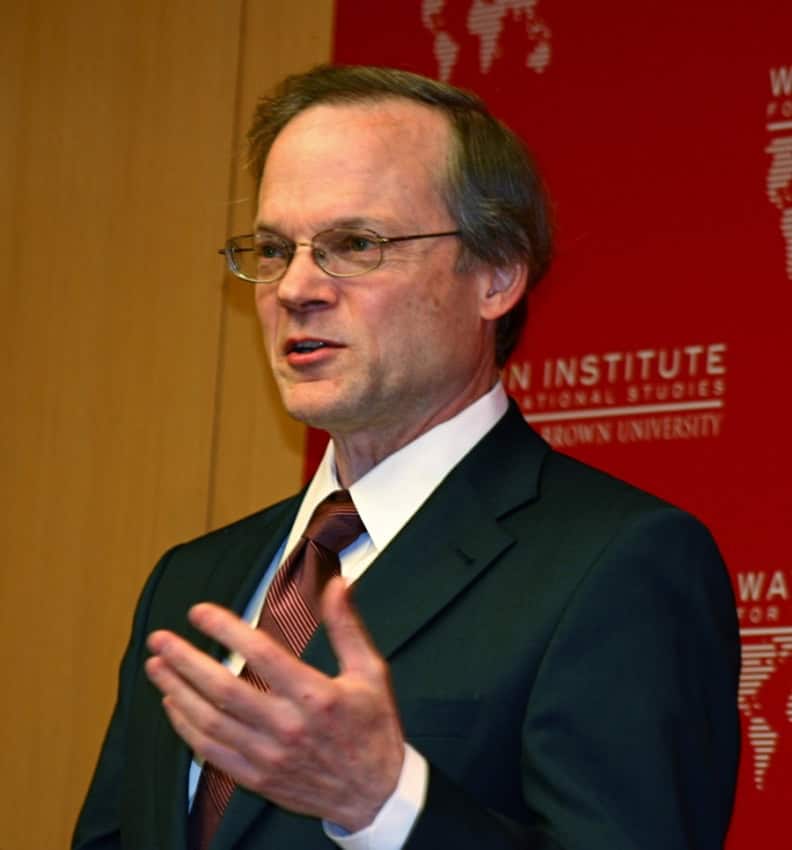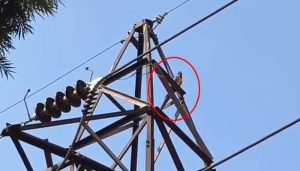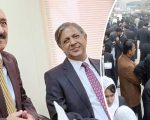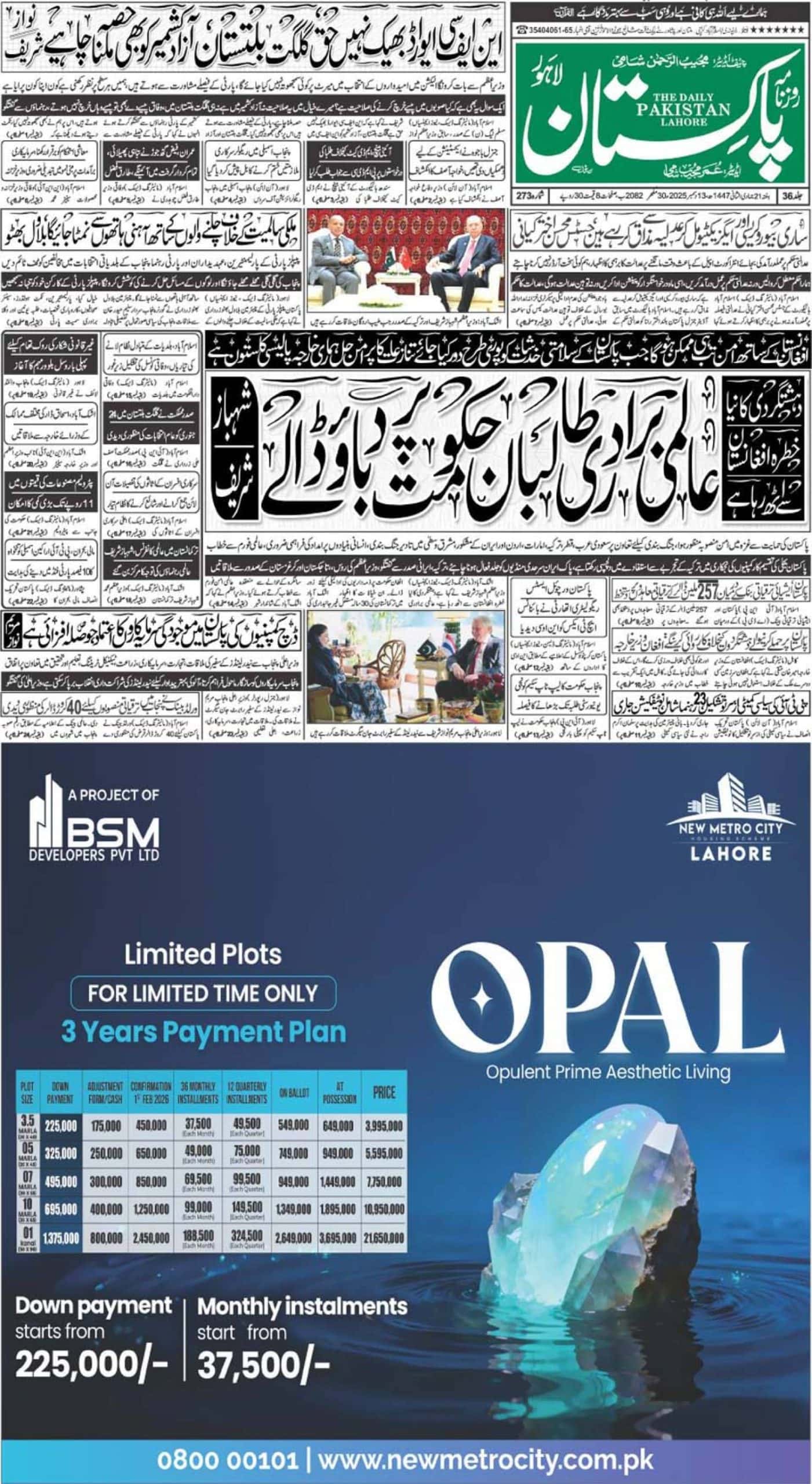VIENNA (Umer Shami) Pakistan and India should find a way to engage with each other or else any miscalculation on part of any country can lead to a nuclear war with catastrophic consequences for the whole world.
United States should offer Pakistan the same nuclear deal as offered to India but should make it conditional to signing of Comprehensive Test Ban Treaty (CTBT). A deal can be reached where India is also compelled to sign CTBT after Pakistan takes lead in this respect. This would be in the long term benefit of Pakistan and could also significantly reduce the prospects of a nuclear arms race in South Asia.
These views were expressed by Mr Mark Fitzpatrick, Director of Non Proliferation and Disarmament Programme at International Institute for Strategic Studies (IISS), a powerful think tank focused on nuclear deterrence and arms control. Mr Mark Fitzpatrick, a former career diplomat in US Department of State now directs the IISS Non Proliferation and Disarmament Programme the other day.
He served as Deputy Assistant Secretary for Non-Proliferation, in his last posting, responsible for policies to address the proliferation problems. He is the author of numerous articles on the subject including “Nuclear Black Markets: Pakistan, A.Q. Khan and the Rise of proliferation networks (2007)” and is also the author of a recent book titled “Overcoming Pakistan’s Nuclear Dangers”.
He was addressing a seminar, as keynote speaker, organized by Vienna Center for Disarmament and Non Proliferation titled “ South Asia : Nuclear Non- Proliferation Challenges and Opportunities”. The seminar was attended by senior Pakistani Journalists as well as relevant diplomatic officials of numerous countries along with a senior US State Department official.
He spoke candidly about dangers of deliberate use of nuclear weapons in South Asia due to miscalculation or misperception by Pakistan or India. He was of the view that any escalation of hostility between the two nuclear armed neighbors, either due to any accident or some terrorist attack, could seriously augment the risk of a nuclear confrontation. “The deployment of battlefield nuclear weapons enhances the chances of turning a conventional war into a nuclear one manifold”.
He further added that South Asia remained the nuclear flashpoint of the world and the next crises was only a matter of time if the current state of mistrust continued between the two arch rivals. He expressed sorrow that there was not much public discourse in India and Pakistan about the devastation that a nuclear confrontation could bring to South Asia in particular and the world in general. Quoting a recent research study on the subject, he said that a nuclear confrontation in South Asia could put to death almost 20 million people and bring famine to atleast 2 billion people due to environmental aftereffects.
He emphasized the need for both countries to bring more transparency in their talks on nuclear issues and implement confidence building measures to reduce the chances of miscalculation. “The nuclear doctrines of both the countries though spelled out clearly lack credibility in each other’s eyes. A mechanism has to be put in place to avoid even the slightest chance of any misperception”.
He advised the participants not to pin much hope on US power to broker a deal every time a potential nuclear crises surfaced in South Asia. “I seriously think that US influence has diminished gradually on both the countries, owing to a number of factors, and it may not be able to broker a deal next time situation takes a turn for the worst. The leadership of both the countries will have to take their destinies in their own hands”.
He however expressed satisfaction on the fact that chances for nuclear terrorism in the region seemed remote. He although did not completely rule out the possibility of extremist groups intercepting or capturing nuclear fission material in Pakistan but nevertheless opined that such possibility appeared very slim. “The real danger is the potential use of nuclear weapons by either side in times of war and then the threat of greater retaliation from other side.”
Answering to a query, he ruled out any chances of Pakistan providing nuclear weapons to Saudia Arabia. He however said that a secret deal between Pakistan and Saudia Arabia to provide Nuclear Umbrella, similar to one provided by US to many countries, in the hour of need could not be negated completely. “It is highly unlikely that Pakistan will invite international sanctions by providing nuclear weapons to Saudia Arabia but an understanding of coming to its aid when the need arises seems more realistic”.
In response to a question that whether implementation of Nuclear Proliferation Treaty (NPT) in its letter and spirit, as it originally envisaged a nuclear weapon free world and committed the five recognized nuclear powers namely United States, Russia, United Kingdom, France and China to also eliminate their nuclear arsenal completely, will provide the major powers moral superiority to demand abolishment of nuclear weapons from South Asia, he showed his support for the idea. “It is most desirable and actually five big powers should live up to their promise, however will it definitely force India and Pakistan to give up their nuclear arsenal remains questionable but plausible”.
Mr Mark also said that there was no doubt that extremist groups in Pakistan had multiplied in recent years and the US invasion of Afghanistan was also to blame for this among other factors. The drone attacks though killed many terrorists but at the same time inadvertent civilian causalities forced many Pashtuns to seek revenge by joining the ranks of extremists, he added. “Thus US cannot be completely absolved from the responsibility of helping Pakistan fight the menace of terrorism”.
He acknowledged that Pakistan had borne the brunt of terrorism for last so many years and merited sympathetic treatment by the international community. However, he added, that Pakistan too should come clean and eliminate all terrorist organizations irrespective of their nomenclature.
He specifically referred to alleged links between ISI and some Jehadist organizations and said that in the past Pakistani establishment had turned blind eye to the groups carrying out subversive activities in Indian held Kashmir. “Actions of Pakistani military establishment over the next few years would determine the true direction of country, seemed shaken to its core in the wake of tragic Peshawar incident”.
Mr Mark however also dismissed usual exaggerated allegations by the Indian administration regarding the safety of nuclear assets of Pakistan and said that as per his information Pakistani establishment not only understood its responsibility as a Nuclear State but did put in place comprehensive processes, with the implicit help of US, to safeguard nuclear assets.













